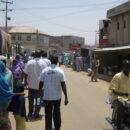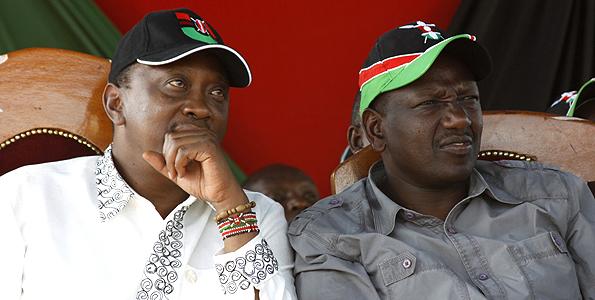Would an arms embargo help end South Sudan’s civil war? – By James Copnall

 In filthy camps for the displaced, thatched huts in half-forgotten villages, and Juba’s proud new concrete buildings, South Sudanese are waiting. As the rainy season peters out, and the deadlines rush to expiration, everyone wants to know whether a meaningful peace agreement will be signed.
In filthy camps for the displaced, thatched huts in half-forgotten villages, and Juba’s proud new concrete buildings, South Sudanese are waiting. As the rainy season peters out, and the deadlines rush to expiration, everyone wants to know whether a meaningful peace agreement will be signed.
Alongside the sort of optimism born of desperation, there is also the fear that the squabble over power, and other issues, will lead to renewed heavy fighting. Can leaders from both sides overcome their differences, their desire for revenge, and their overwhelming need for power?
If not, if the war rumbles back to a heightened state of intensity, if thousands more are killed, and hundreds of thousands more displaced, there must be consequences.
Already the US and the EU have imposed sanctions on individual commanders accused of breaking the cessation of hostilities agreement. To date, though, these have been on field commanders rather than on those with real decision-making power.
More than 50 South Sudanese and international human rights organisations have called for an arms embargo to be imposed on both sides, in an effort to make further conflict less feasible. The rights groups wanted the regional mediators IGAD to inform the UN Security Council of a ‘clear request’ to impose the embargo.
IGAD did not go quite that far, but the mediators were unusually direct in the November 7 communique following IGAD’s 28th extraordinary summit. South Sudan’s neighbours threatened collective action, including, but not limited to, asset freezes, travel bans, and the ‘denial of the supply of arms and ammunition, and any other material that could be used in war’.
The threat of regional sanctions is now explicit, along with the possibility of further US and EU action, and even UN measures too. But how likely is it that sanctions will be applied?
The first point to note is the extent to which IGAD drives international thinking about South Sudan. Individual countries or entities may opt to punish the South Sudanese leaders, but UN sanctions are unlikely unless IGAD acts first.
There is some logic to this. After all, IGAD, for better or worse, is in charge of the mediation process. It is also difficult to see how meaningful sanctions could be imposed on South Sudan if neighbouring countries were not prepared to apply them.
Second, the terms of IGAD’s sanctions threat are interesting. Targeted sanctions are directly tied to any ‘violation of the cessation of the hostilities by any party’. The key point here is that IGAD is not threatening sanctions on leaders who fail to make the necessary concessions needed for peace, merely on those who break the cessation of hostilities.
It is not immediately clear if this would target the individual commanders, or those higher up the chain. Is IGAD sending a shot across the bows of Riek Machar and Salva Kiir? Or warning those giving the orders in the field?
Linking the sanctions to Cessation of Hostilities violations means that it is particularly important to increase the effectiveness of the monitoring and verification teams. At the moment, they struggle to work in SPLM/A – In Opposition areas.
So far, although the monitors have accused both sides of initiating conflict, most of the blame for the violations has been directed at the SPLM/A-IO forces.
Both the rebels and the government have expressed, at different times and for different reasons, their reservations about IGAD’s neutrality. In fact, there are strong reasons to question whether IGAD are the right people to adjudicate sanctions.
Uganda is heavily involved militarily in the conflict. Its troops have fought alongside forces loyal to Salva Kiir. Both Uganda and Kenya have strong economic interests in South Sudan too. Neither is particularly likely to want to impose sanctions on those in power in Juba.
Sudan, for all its public declarations of support for Kiir, has also been accused of supporting his enemy, Riek Machar. The neighbours are all too involved in the conflict to be considered impartial.
There is a possibility that any regional punishments will not be a fair reflection of the abuses on the ground. There must also be serious doubts, given their obvious interests, whether the region is really prepared to take the necessary steps to impose sanctions.
This is unfortunate, because I believe sanctions are necessary.
It is certainly possible to argue that they may not be effective. Economic sanctions in Sudan have largely hurt the people, not the politicians. Travel bans and asset freezes may not be enough to deter further conflict.
However, those who commit abuses simply cannot be allowed to escape without punishment. Those who have fled conflict, or been raped by unruly soldiers, or suffered the unnecessary pain of a lost loved one, deserve to know that the world is watching, and will punish anyone who continues to fight.
This idea must be extended, too, to a more general sense of accountability, which has been missing in South Sudan for so long. When the conflict ends, the worst abusers must face justice, both for the sake of their victims, and to deter future fighting.
The AU Commission of Inquiry report on South Sudan will make interesting reading. Several sources suggest a strong draft has already been written, in which names are named. This could form the basis for future prosecutions – if that version makes it out into the public domain.
Among the sanction options suggested by IGAD, the arms embargo seems the most promising. It has the potential to squeeze the warring parties’ ability to fight, if not stop the war entirely. It would need to be thoroughly policed, however, and here regional commitment to the embargo would be vital.
However one option outlined by IGAD seems to me to contain more risks than potential rewards.
Point 4 of the 7 November communique states that: ‘Further, the IGAD region shall, without further reference to the warring Parties, take the necessary measures, if need be, to directly intervene in South Sudan to protect life and restore peace and stability.’
This threat of military action, surely intended to push Kiir and Machar to a deal as quickly as possible, should remain just that: a threat.
Already the military presence of the Ugandan troops, and apparent Sudanese support for Machar, has made resolving the conflict more complicated.
Regional military action runs the risk of regionalising the conflict, the last thing South Sudan needs.
James Copnall is a journalist and author of “˜A Poisonous Thorn in Our Hearts: Sudan and South Sudan’s Bitter and Incomplete Divorce’. He is editor of “˜Making Sense of the Sudans’.







South Sudan problems Will only be solved by South Sudanese , whether by military, peace, but sanctions, UN deals , world oil looters like west will not threaten us (Dinka in particular) we fought Arabs, Nuers alongside arabs, for 22 years upto 2005 .
UN, and West should understand there is no new colonization for South Sudan, we not like Somalia, Yeman ete, time is not yet, we still block of tribes.